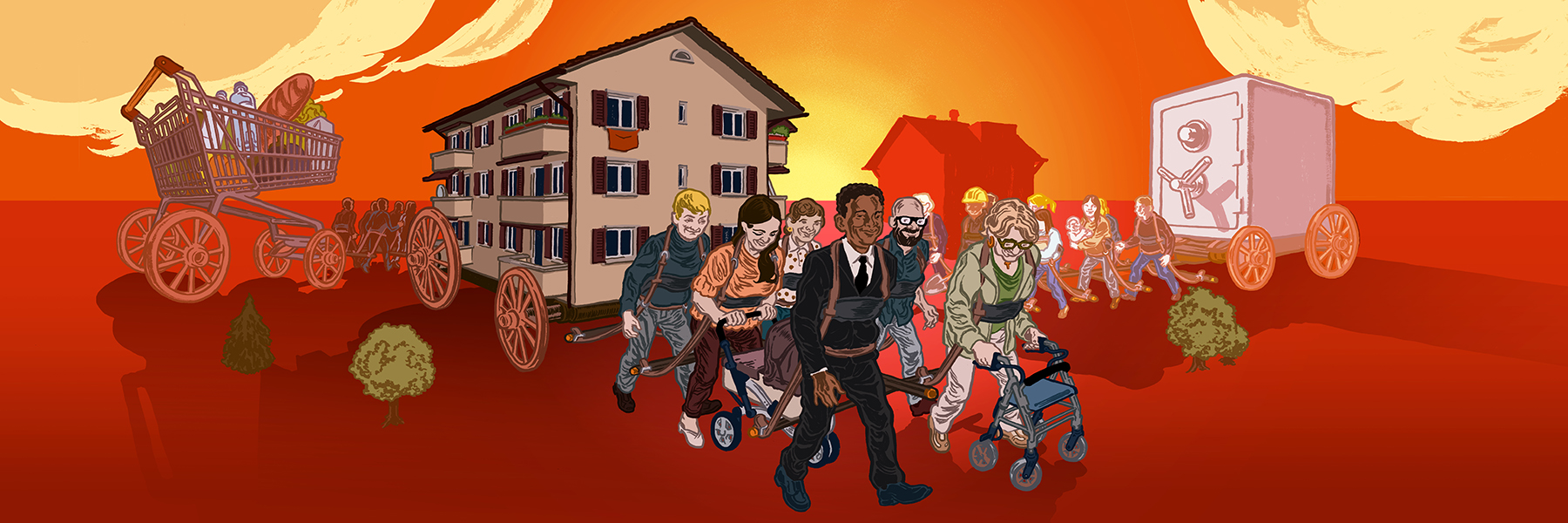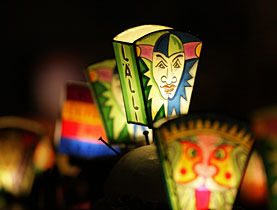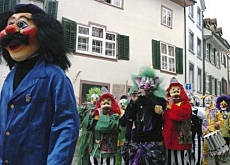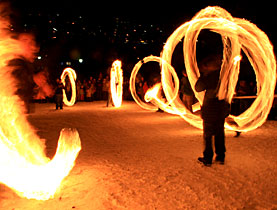
Banks to be lampooned at “cabaret” carnival

Banking secrecy and the Libyan affair will be the butt of jokes at Switzerland's best known carnival, the Fasnacht of Basel, that begins on Monday.
The head of the organising committee, Felix Rudolf von Rohr, tells swissinfo.ch that it is the lengths Basel goes to to lampoon events of the past year that set its three-day festival apart from other carnivals.
Just when carnival comes to an end in most other cities, Basel’s is just beginning. And whereas carnival is normally an occasion for people to dress up as they like and party, Basel’s unique event has an unwritten but very clear code on what goes and what doesn’t.
Fasnacht begins at 4am on the Monday following Ash Wednesday with Morgestraich, a march by hundreds of large and small groups known as Cliques and Schyssdräggziigli. They all play the same marching tune, only on piccolos and drums, and carry gigantic lanterns painted with a theme, or “Sujet”, they have chosen to lampoon.
swissinfo.ch: Morgestraich kicks off what people in Basel know as the three most wonderful days of the year. Why are they considered so special?
Felix Rudolf von Rohr: Basel is different. The 72 hours of Fasnacht is one aspect that makes it different from all other carnivals in the world. In Germany they start on November 11 and go for months. In Basel it’s concentrated in three days from Monday morning to Thursday morning at 4am exactly.
swissinfo.ch: One could argue that the most wonderful days in Basel or any other Swiss city are the days in November or December when people working in the banking sector receive their bonuses. From your own experience since you worked in the banking sector for many years, would you agree?
F.R.v.R.: It’s exactly the same. Carnival is the bonus for all of the work and preparations that have gone into the event over the whole year. The fun and joy of carnival is the bonus.
swissinfo.ch: Another thing that really makes Basel’s carnival different is the “Sujet” or themes that are lampooned each year. The Sujet are painted on the lanterns and poked fun at in satirical verse by the small groups of musicians and singers. Will banking secrecy be up for ridicule this year?
F.R.v.R.: Certainly. The Sujet separate Basel from other carnivals. We make jokes – sometimes very seriously – about world events and what happens in society and that changes from year to year. And certainly banking secrecy will be one of the big themes this year.
swissinfo.ch: As someone who worked in the industry, do you have a problem with banking secrecy being laughed at?
F.R.v.R.: Absolutely not. I think if there has been wrongdoing then we have to give the issue a place in carnival, whether it’s banking, or any other event involving Swiss policy. What happened with [Libyan ruler Moammar] Gaddafi, America, Berlusconi and Sarkozy, banking secrecy and so on. These are subjects that have to be treated at Basel’s carnival.
swissinfo.ch: What about the decision by Swiss voters to ban the building of minarets? That was a subject last year that really put Switzerland in the international spotlight?
F.R.v.R.: I think it will be mentioned, but it will be low key. Switzerland approved the ban, but a majority of voters in Basel said no to it. And it’s a delicate subject. We are very careful about anything that has to do with religion or race. The people of Basel know how far they can go. It can be treated with very subtle humour – not making fun of minarets but ourselves for how we voted.
swissinfo.ch: So the Swiss know how to laugh at themselves?
F.R.v.R.: I don’t know if the Swiss can laugh at themselves, but the people of Basel can. We are first and foremost people of Basel, and secondly we are Swiss.
swissinfo.ch: When one thinks of carnival, one thinks of letting one’s hair down – partying and drinking.
F.R.v.R.: This is not the carnival of Basel. Of course carnival here is fun – because of the music – and very colourful. It’s also a time to strengthen friendships and be together like one big family. But Basel Fasnacht has the duty to treat what happens in the world. It’s like a big cabaret, in fact.
swissinfo.ch: Peter Habicht, the author of a book on Basel carnival, Lifting the Mask, said Fasnacht is much more than what you see or hear. It’s an attitude. Would you agree with that?
F.R.v.R.: I would. What happens over the three days of carnival, and over the year while preparing, helps bring the people of Basel together and makes the city a special place. It’s part of the character of our city the whole year through.
swissinfo.ch: As you said, the three days of carnival are the culmination of 12 months of preparation. Can Fasnacht be described as an industry? The masks have to be made, the costumes sewn, the Sujet painted on the lanterns. And during the three days, restaurants and hotels do a booming trade.
F.R.v.R.: Partly. Carnival generates about SFr30 million ($28 million) each year – for food, for hotel rooms, for the material to make the masks and costumes – but the main work that goes into the masks and lanterns and everything else is done on a voluntary basis. A study found that volunteers donate about 500,000 hours of their time for carnival each year.
swissinfo.ch: How long have you been taking part?
F.R.v.R.: I first wore a costume when I was 12, which was in 1956. It is memorable because it was the coldest carnival we ever had. It was minus 17° C during Morgestraich. You can imagine how hard it is to play a piccolo or to drum when it’s that cold!
swissinfo.ch: Can I join the festivities by putting on a silly nose and banging a plastic drum?
F.R.v.R.: That would be the worst thing you could do. You would be ignored. Because funny noses and dyed hair and painted faces have nothing to do with the carnival of Basel. Anyone doing that learns very quickly that they’ve come to the wrong party.
Dale Bechtel, swissinfo.ch
Monday – Morgestraich march begins at 4am
Monday and Wednesday – parades at 1.30pm. About 10,000 masked carnival participants take part, and the piccolo players and drummers are joined by “Guggenmusik” brass brands.
Monday and Wednesday evenings – more than 100 groups of “Schnitzelbank” singers tour the city’s bars and restaurants, reciting satirical verses about events that made the headlines over the past 12 months.
Tuesday evening – More than 200 of the painted lanterns are illuminated and displayed in the cathedral square. Guggenmusik bands take over the streets with their loud and discordant performances.
Although the oldest written record of carnival in Basel goes back to the 14th century, today’s festival began to take shape in the 1800s. And it was only in 1910 that an organising committee was created to coordinate the various activities.
To mark the 100th anniversary of the “Fasnacht Comité”, Swiss Post has for the first time ever paid homage to a Swiss carnival by issuing a special series of commemorative stamps depicting Basel Fasnacht.
And the Tinguely Museum in Basel is paying tribute with a temporary exhibition that celebrates the art of Fasnacht over the years – focusing on the magnificent painted lanterns.

In compliance with the JTI standards
More: SWI swissinfo.ch certified by the Journalism Trust Initiative





































You can find an overview of ongoing debates with our journalists here . Please join us!
If you want to start a conversation about a topic raised in this article or want to report factual errors, email us at english@swissinfo.ch.